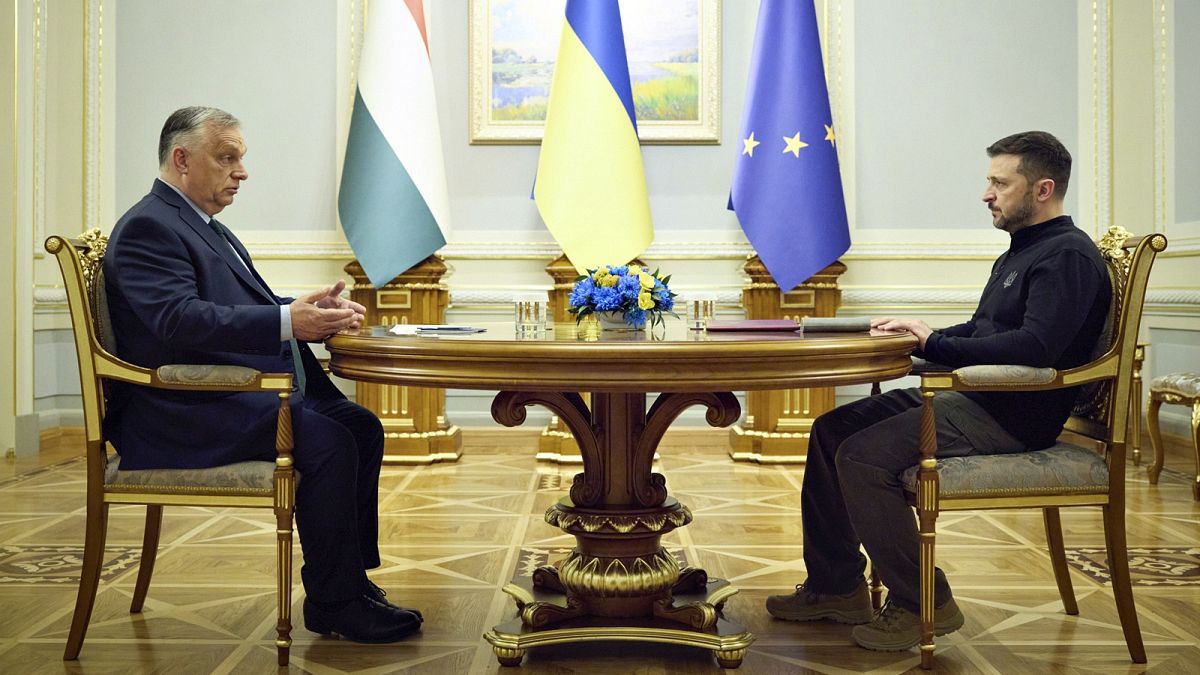Denmark aims to use its six-month presidency of the EU Council to put “maximum pressure” on Hungary to lift its unyielding veto on Ukraine’s EU membership negotiations, which has triggered visible exasperation in Kyiv and Brussels.
Every step in the enlargement process requires unanimity.
“This is important for the Ukrainians. This is important in their fight (against Russia). They need to have the perspective of EU membership. And we are not taking that perspective away,” Marie Bjerre, Denmark’s minister for European affairs, said on Thursday during a briefing with journalists, including from Euronews, in Aarhus.
“We are very ambitious and we will do all we can. We will put maximum pressure on Hungary in order to lift its reservations. And we are willing to do all that we can, politically and practically, in order to move forward with Ukraine and also Moldova and the countries in the Western Balkans.”
Bjerre did not detail any specific method to bypass the Hungarian veto, simply saying it was “too soon” to tell whether it had become effectively insurmountable.
The minister repeatedly warned that fulfilling the promise made to candidate countries was essential to strengthen the “security and stability” of the European Union. “If we do not move forward with enlargement,” she said, “we risk losing some of these countries.”
The Danish presidency echoes its predecessor, Poland, with its public pledge to advance both Ukraine’s and Moldova’s membership bids as much as possible. The bids have been paired since both countries were declared candidates in June 2022.
But the Polish presidency came and went, and no progress whatsoever was achieved. Ukraine and Moldova are still waiting to open the first cluster of negotiations, known as “Fundamentals”, which covers topics such as democracy, human rights and security.
The main reason lies with Viktor Orbán and his firm veto on Kyiv’s ambitions. The Hungarian prime minister went as far as organising a national consultation to gauge the opinions of his fellow citizens on the potential admission of Ukraine into the bloc.
According to Orbán, 95% of almost 2.3 million participants who answered the consultation opposed the candidacy. Turnout was roughly half the 5.5 million votes recorded during national elections in 2022.
During last week’s EU summit, Orbán cited the results as a basis to double down on his veto, saying: “I came here with a strong mandate.”
“If a member of the European Union is in a war, it means that the European Union is in the war, and we don’t like it,” he told reporters.
The European Commission replied by saying there were “no objective reasons” to oppose Ukraine’s accession, as the war-battered country had delivered the requested reforms and met the necessary criteria to open the “Fundamentals” cluster.
The impasse is so entrenched that diplomats have begun mulling the idea of decoupling Moldova from Ukraine to allow the former, which Orbán supports, to proceed. Decoupling, though, is a high-stakes gamble, as it risks leaving Kyiv permanently behind and perpetuating the impression of a broken promise to the Ukrainian people.
As Council presidency, Denmark will be tasked with moderating the debate should the uncomfortable question be put officially on the table.
For the time being, Copenhagen is betting on keeping the pair together.
“We’re still working on opening cluster one with both Moldova and Ukraine because that is the best solution,” Bjerre said, noting it was too early to “speculate” about alternatives.
“The reason why we have this new momentum on enlargement is due to Ukraine. We would not be talking about enlargement today if it were not because of Ukraine and the tremendous progress Ukraine has made.”
The EU and Moldova are set to hold a bilateral summit on Friday.

